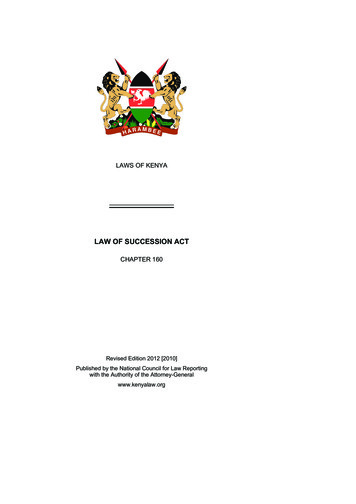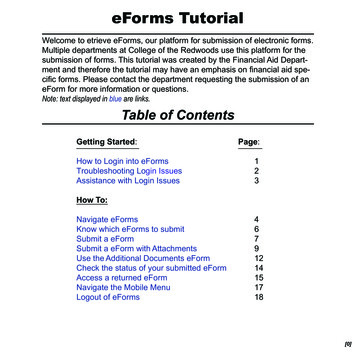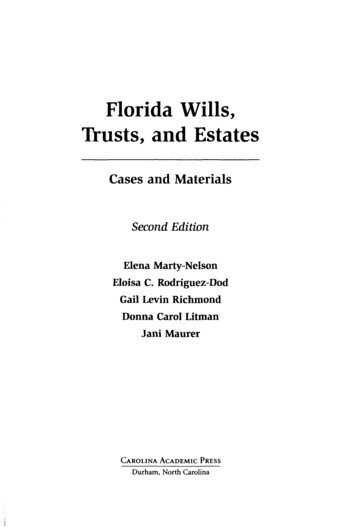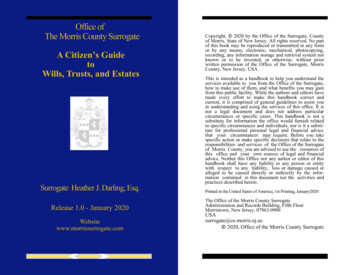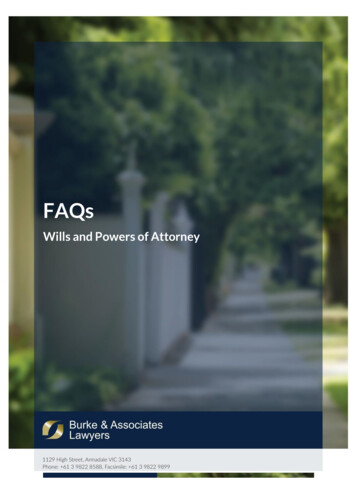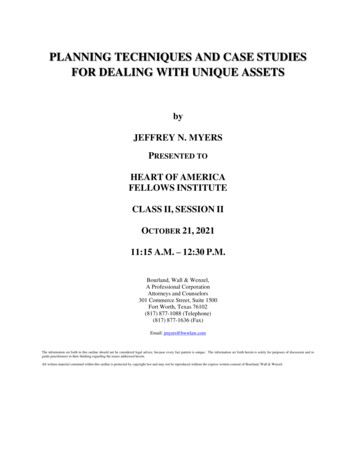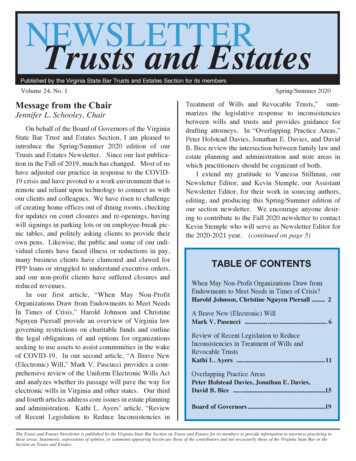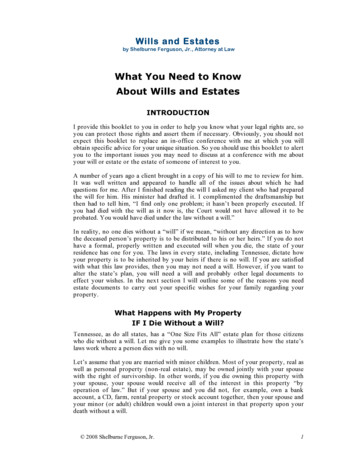
Transcription
Wills and Estatesby Shelburne Ferguson, Jr., Attorney at LawWhat You Need to KnowAbout Wills and EstatesINTRODUCTIONI provide this booklet to you in order to help you know what your legal rights are, soyou can protect those rights and assert them if necessary. Obviously, you should notexpect this booklet to replace an in-office conference with me at which you willobtain specific advice for your unique situation. So you should use this booklet to alertyou to the important issues you may need to discuss at a conference with me aboutyour will or estate or the estate of someone of interest to you.A number of years ago a client brought in a copy of his will to me to review for him.It was well written and appeared to handle all of the issues about which he hadquestions for me. After I finished reading the will I asked my client who had preparedthe will for him. His minister had drafted it. I complimented the draftsmanship butthen had to tell him, “I find only one problem; it hasn’t been properly executed. Ifyou had died with the will as it now is, the Court would not have allowed it to beprobated. You would have died under the law without a will.”In reality, no one dies without a “will” if we mean, “without any direction as to howthe deceased person’s property is to be distributed to his or her heirs.” If you do nothave a formal, properly written and executed will when you die, the state of yourresidence has one for you. The laws in every state, including Tennessee, dictate howyour property is to be inherited by your heirs if there is no will. If you are satisfiedwith what this law provides, then you may not need a will. However, if you want toalter the state’s plan, you will need a will and probably other legal documents toeffect your wishes. In the next section I will outline some of the reasons you needestate documents to carry out your specific wishes for your family regarding yourproperty.What Happens with My PropertyIF I Die Without a Will?Tennessee, as do all states, has a “One Size Fits All” estate plan for those citizenswho die without a will. Let me give you some examples to illustrate how the state’slaws work where a person dies with no will.Let’s assume that you are married with minor children. Most of your property, real aswell as personal property (non-real estate), may be owned jointly with your spousewith the right of survivorship. In other words, if you die owning this property withyour spouse, your spouse would receive all of the interest in this property “byoperation of law.” But if your spouse and you did not, for example, own a bankaccount, a CD, farm, rental property or stock account together, then your spouse andyour minor (or adult) children would own a joint interest in that property upon yourdeath without a will. 2008 Shelburne Ferguson, Jr.1
This could create serious problems for your spouse particularly if the children areminors. If the children are minors, they cannot legally sign over their interests in thejointly held property to your spouse. Also, if the property needed to be sold, theminor children could not legally sign the deed to sell the property. To allow yourspouse to sell the residence, for example, a lawsuit would have to be filed to separatethe minor children’s’ interests from that of your spouse. That can be a timeconsuming and expensive proposition. I can explain the implications of this furtherat our conference. In addition, it may have been your desire that your spouse ownthat property outright at your death, however, under the law your souse would shareownership with your childrenOr consider the situation where you have children from a prior marriage as well aschildren from your current marriage. Assume that your spouse dies with no will,owning a substantial 401(k) with no specifically designated beneficiaries being namedin the 401(k) document. You and your spouse’s children by this marriage togetherwith your children from the prior marriage will all share in the proceeds of the401(k). This often creates a very difficult issue to unravel legally as well asemotionally.Let’s take one more example to demonstrate another serious problem not having awill can create. You and your spouse have three minor children and a joint estateincluding life insurance of nearly 1,000,000 and neither of you has a will. You andyour spouse are killed instantly in a common accident. What will happen with your 1,000,000 estate as it relates to your children and who will take care of them?Someone will need to be appointed legal guardian and physical custodian of thechildren. If you had a will you can suggest who should be the guardian and the trusteeof the money. Without a will the net proceeds of your joint estate would be placed inthe court registry (the bank account of the court) at a safe interest rate until eachchild reaches adulthood, i.e.18 years, at which time the child’s proportionate sharewill be distributed to the 18 year old. Most parents don’t want to have an eighteenyear old receive a substantial amount of money with no control over how and when itis spent. With a will all of these issues can be addressed to your satisfaction.The following is a summary of what happens under certain circumstancesif you die and have no will and your property is non-right ofsurvivorship property: Upon your death your property will be divided among your spouse and allyour children whether your children are from your current marriage or a priormarriage. If you have no children then your spouse will receive all of your property nototherwise designated by a beneficiary designation for example. If your spouse has predeceased you then all of your children will share equallyin your estate. If you have no spouse or children then your parents will inherit your estate. If you have no spouse or children and your parents have predeceased you thenyour brothers and sisters will share in your estate; or if a brother or sister haspredeceased you, then the deceased sibling’s child or children will receive thatshare. If you die with no spouse, no children, no living parents and no brothers orsisters, then your other living descendents will receive a share in your estate. If you have no legal relatives who survive you then the state will receive yourestate, though this is very rare. 2008 Shelburne Ferguson, Jr.2
Now let’s look at a few of the things you can do with a will rather than relyon the state’s plan for your property: You can designate specifically who should and who should not receive anyportion of your estate other than fully disinheriting a spouse. You can designate particular properties to specific people. You can place your properties into a trust through your will that willprovide for the proper care of your spouse, your children, your parents andother people or even animals. You can establish a trust outside your will, called A Living Trust, intowhich you can transfer all or part of your property for distribution at yourdeath or even management during your life. You can give certain family members more or less than the law might givethem without a will. You can give money or property to charity. You can make certain that a specific person receives nothing from yourestate. You can provide for the management of your business or property and theorderly sale of such assets. You can perhaps save on inheritance taxes through certain estate planningarrangements. You can name the guardian for your minor children. You can name who will be the personal representative of your estate. You can waive the personal representative’s bond, the requirement of aninventory or interim accountings and save your estate the expense of suchrequirements. You can allow a specific person to reside in the residence. You can establish a memorial to someone you admire and fund its upkeep. You can fund for the care of pets and animals. You can set up a trust to provide for the care, maintenance, health andeducation of children or grandchildren. You can direct the disposition of your body, for example, for scientific useor transplants, etc.No one likes to think about death even though we know it is inevitable. Yet we owe itto our families to consider what will happen if we don’t do at least some planning forthem for their future. If you do nothing more you should at least set a conferencewith me to discuss your current situation and to review the various “what if’s” thatcould happen if you were to meet an untimely accident. I will walk you through whatcan occur if something tragic happens.It should be clear that in most cases to rely on the will that the state provides to itscitizen who die without a written will is not what most people want to have happen.It ought to also be obvious that serious thought and discussion with your spouse andfamily should precede the office conference with me. 2008 Shelburne Ferguson, Jr.3
Do I Need an Attorney to Write my Will?You can write your own will. In fact, Tennessee allows a person to write his or herown will in their own handwriting and it does not require witnesses or notarization.I must warn you that I have been presented with handwritten wills over the years byfamily members asking that they be probated. Unfortunately many of these willscreated serious legal issues that ultimately cost far more money to correct that itwould have cost to have an attorney properly write the will in the first place. Willsand estate issues are quite technical and demand that the wording be clear as to whatthe person writing the will wants to have happen. It is far better to allow a legallyqualified person to make sure that your expectations will be clear and can be legallycarried out.There are numerous issues today about employee benefits, life insurance, pensions,real estate and blended families that the non-lawyer may not realize. Also, since weare so mobile, some states do not have the same rules about estates as doesTennessee. So what you create on your own in Tennessee may not be valid in thestate to which you may ultimately move.Generally, a person who relies on a non-lawyer to help them “for free” usually getstheir money’s worth. As I was told in law school, “Anyone who represents himselfhas a fool for a client.” The typical cost of relatively simple wills, powers ofattorney, healthcare directives (Living Wills) and related documents for both ahusband and wife runs anywhere from 350.00 to 500.00.Of course more sophisticated estate planning can cost more, but I will give you a costestimate before I begin.While I realize that for some people even 300.00 is a lot of money, I believe thatthe alternative is potentially far more expensive for your family later and it may besomething that cannot be corrected after you are gone no matter what the cost.At the very least, if you have written your own will, call me for an appointment toallow me to review your will and make certain it is properly drafted and is going to dowhat you want it to. The small fee for my time now will save your family much moremoney later on.What Do I Do Before Coming to See You?It is helpful if you compile a written inventory of all of your property (real estate,personal property, collectables, insurance, etc.), showing how it is titled, its fairmarket value, the balances on any mortgages against the properties, beneficiariesnamed on insurance and employment benefits, bank balances and so forth.Next you should think through and discuss your goals with your spouse.The following are suggested goals to consider: Determining who will be the guardians for the minor children. Providing for the care of parents in declining health. Avoid conflict among surviving children. Saving on income, estate and inheritance taxes. Providing a means of liquidating debts or providing sufficient resourcesand proper oversight of funds to care for children through college. 2008 Shelburne Ferguson, Jr.4
Deciding who will operate or manage a family business. Provide for estate liquidity to pay for ongoing expenses such as real estatetaxes, maintenance, and final expenses.Determining who will be the trustee of any trusts created for children orother purposes. Providing for charitable bequests. Choosing what professionals will provide counsel. Selecting who would be substitute guardians, trustees, managers if theones selected can’t serve. Selecting alternatives to forcing the sale of properties to pay estate orpersonal obligations. Determining how much life insurance is needed on whose life and whowill own the policies.Since most persons today have determined that they want to have a say in theirhealth treatment in their final days, there needs to be a frank and clear discussionbetween spouses and the adult children as to your wishes. I can supply you with thehealthcare plan also called a directive that has virtually replaced the Living Will inTennessee so you can use it as a point of discussion among yourselves so that yourwishes are abundantly clear to everyone.What are Powers of Attorney?A power of attorney (POA) is a written, legal document that names another personwhom you choose to act on your behalf. In estate planning, generally each spousenames the other spouse as his or her “attorney in fact” to do certain designatedthings for the other spouse. The POA can be written so it is effective upon signing orit can be written to be effective only when the person establishing the power ofattorney becomes physically or mentally incapable of acting and a physician certifiesin writing that the person is incapacitated. The latter is called a “springing power ofattorney” in that it “springs” into effect when the certification by the physicianoccurs.You may have heard of a power of attorney being called a “durable power ofattorney.” A durable power of attorney is one which is drafted so that it survives theauthorizing person becoming mentally incapacitated. Under the law a non-durablepower of attorney would become useless upon the person becoming mentallyincompetent because he or she could no longer direct the attorney in fact as to whataction the attorney in fact is to take. Most people want the power of attorney to bein effect if they are incapacitated so they elect the durable power of attorney.While a POA is an extremely helpful legal instrument, it does have its limitations anddangers. For example, there is generally no legal oversight by a court of the actionsof the attorney in fact. There is no legal requirement to report to the court systemany actions taken by the attorney in fact. What this means is, if the attorney in facttakes advantage of the person who appointed the attorney in fact, until those factsbecome known, no one would have notice to take action to protect the otherperson’s interests.I generally put it this way when speaking to clients even in long term marriages aboutexecuting powers of attorneys to each other: “ This is the most powerful document anindividual can sign because you are authorizing the other person to do virtuallyanything you could do for yourself. He or she can sell your car, transfer or close your 2008 Shelburne Ferguson, Jr.5
bank account, sell your interest in the residence. So if you trust him or her implicitly,then go ahead and sign it. If you have any doubt, then do not sign it.”While most spouses do execute POA’s to each other, I have some who have agreed towait. There is nothing wrong with that.The other type of power of attorney is one in which the one establishing the POAauthorizes the attorney in fact to make healthcare decisions if he or she is notcapable expressing his or her desires at the time the decision needs to be made. Thisauthorization can also be accomplished by the healthcare directive.Do I Need a Living Trust?There are organizations and attorneys who promote living trusts as doing far morethan they are capable of doing. A living trust is written legal document in which aperson establishes a revocable trust to actually hold title to property for the personestablishing the trust or for another person. “Revocable” means that the trust can beabolished and the property being held by the trust can be transferred back to the priorowner. Under this type trust the beneficiary of the trust can also be the trusteethereby maintaining control of the property.This type of trust does not protect the property from creditors. It may avoid aformal probate, but not in all cases. It does not avoid the taxability of an otherwisetaxable estate. In spite of the hype that some promoters make of the revocable livingtrust that you can avoid probate and the expense of a will, you may still need a willbecause if you do not transfer all of your property of every type into the trust youwill still need a will.The value of a living trust is significant if an individual or couple own real property intwo or more states. The revocable trust can pass the property without there havingto be a probate of the will in every state where the deceased person owns property.Another difficult issue in the use of such a trust is that if there is a mortgage on anyproperty to be placed into the trust often the holder of the trust will not allow thetransfer of the property into the trust or in extreme cases the mortgage holder willcall the loan due if the property is transferred. We can discuss the strengths andweaknesses of such a trust at a conference.How Do I Go about Selecting a Trusteefor my Children’s Trust?Most parents with minor children or even with young adults want to protect theirchildren’s money or property that they inherit from their unwise life choices. I havepreviously discussed the use of a trust that postpones the outright control of thechildren’s money or property until they are more mature and wiser.Typically, the trust provision that is placed into the will provides that if both parentsare gone a trust will be created with a fund for each child named in the will to providefor their health, care, maintenance, upkeep, education and well being of the childuntil the child reaches a pre-established age. Some clients opt for a college incentiveclause to encourage their children to complete a college education. I can explain howthis incentive works. 2008 Shelburne Ferguson, Jr.6
It is critical in this situation for the persons making their wills to select the properperson or the right trust department of a bank or financial institution to oversee thetrust funds. Without question, the trustee must be honest and trustworthy.One advantage in having a bank trust departments serve as trustee is that the bankwill be obligated to stand behind the actions of their trust department. In addition,there are state and federal agencies that periodically audit the trust departments andwill report any irregularities. Of course the bank trust department is generally skilledin the obligations of a trustee for which they are entitled to a fee. However, there isno obligation that you use a trust department to handle your estate funds. A trusteecan be a family member or trusted friend.In addition to being able to comply with the accountings required by the probatecourt, the trustee should have the skill to manage the investment of the trust assets insafe investments that will create value and income for your children or grandchildren.A trustee also needs the ability to say yes and no to a trust beneficiary. Let meexplain.Just as in an intact family the needs of the children covered by a trust change undervarious circumstances that are not always predicable. For example, a child that isinvolved in cheerleading or a sports activity my incur unanticipated expenses that thetrustee should recognize as valuable to the child’s development and say “yes” to therequest for additional money.On the other hand a trustee may be faced with a child saying that he has found theperfect car to haul him back and forth to school, a beautiful fire engine red Corvettefor only 68,000.00 plus tax. At that point the trustee may need to say, “No,” Ihave found you a very nice used Cavalier that will do very well, thank you verymuch.”What is the Process for you inDrafting My Estate Documents?At your initial conference with me I will be asking you to tell me information aboutyour estate, your family and your goals for what you have. I will be happy to answeryour questions, describe the options you have and to guide you through the process ofyour estate plan.Next we will begin to outline what you want to happen with your estate should one ofyou die; should both of you be killed in a common accident or if the two of you andyour children should be tragically killed.The initial conference generally lasts approximately an hour. I will have takensufficient notes to be able to draft your wills for review at a second conference whichis scheduled at your convenience generally within a week from the first conference.At the second conference you will be given drafts of your wills and any other relatedestate documents such as the powers of attorney and healthcare directives. Anymodifications or changes can be made quickly. Once the documents are prepared toyour satisfaction they will be properly executed and witnessed. You will be given theoriginal of each document along with a copy.While the copies are being made I will discuss with you matters such as the use of thepower of attorney, where to keep the originals of your documents, the care andprotection of the originals and the process of probating a will. The second conferencecan also take as much as an hour. 2008 Shelburne Ferguson, Jr.7
What Is A Will Contest And How Can I ProtectMy Estate From A Legal Challenge?Occasionally someone will file a legal challenge to the probate of a will called a “willcontest.” A will contest is a lawsuit in which someone with a potential interest in theestate claims that the deceased person id not properly make a will. There are only afew grounds on which to challenge a will. The most usual ground for challenge is thatdeceased person was not of sound mind at the time of the making of the will, that is,the decedent was senile, mentally incompetent or delusional at the time that the willwas signed. Another challenge to a will is that the decedent was unduly influenced orcoerced into making a will by someone else and that the will actually represents thewishes of the third person not the decedent. Rarer is a challenge based on fraud, aforgery or the failure to properly execute the will under the requirements of the law.If you fear or suspect that someone may attempt to challenge your will you should letme know immediately. I will discuss with you what can be done to help protect yourwill and estate from a will contest.How Much Can I Give My FamilyWhile I’m Living?A spouse can give any amount of gift to the other spouse tax free. An individual cangive 12,000.00 annually to a child, parent or any other person without incurring agift tax. Generally the donor of the gift is the one who becomes liable for a taxablegift. A husband and wife can jointly give 24,000.00 to each child or other individualeach year. For example, my wife and I could give together 24,000.00 on December31 to each of our four children and an equal amount on January 1 of the next year.Is There A Problem With Establishing Joint BankAccounts With One Or More Of My Children?Most joint bank accounts established with another individual are what are termed“survivor accounts.” In other words, when one of the holders of a survivor accountdies the money becomes the survivor’s money “by operation of law.” For example,Mom, a widow, sets up a 100,000.00 savings account in her and her eldest’s son’sname. Mom thinks that she is making it easier for her son to have access to fundsshould she become disabled. She does become disabled and dies of complications ofsurgery. Upon her death the son claims that the savings account is his since it washeld in his joint name with his mother and it was set up by the bank as a survivoraccount.Even though Mom’s two other children protest, the elder son is entitled to all of themoney because it was a joint account with right of survivorship. Even if the sonwants to distribute one-third of the money to his siblings, it could create a gift tax forhim since he would be giving over 33,000.00 to each of his siblings. (Remember anyannual gift over 12,000.00 is a taxable gift to the donor.)Please let me know if you have established joint bank accounts with someone otherthan your spouse so we can discuss the legal implications of this arrangement.Generally, a power of attorney is a better option to setting up joint accounts. 2008 Shelburne Ferguson, Jr.8
Will Establishing a Trust for Our ChildrenRequire Us to Change the Beneficiary Designationson our Insurance Policies and Retirement Benefits?Most of us set up a first and second beneficiary on our insurance policies andretirement benefits. We generally name our spouse as primary beneficiary and ourchildren as secondary. The problem with that arrangement comes after we write a willin which we establish a trust to take care of our children into their young adult lives.Under such an arrangement, even though we have a trust in our will, upon our death(assuming our spouse predeceased us) the insurance proceeds will be paid directly toour children when each turns eighteen and therefore bypasses the trust in our will.The simplest way to avoid that undesirable consequence is to change your secondarybeneficiary designation from named children to “Payable to my estate” or “Payablepursuant to my will.” Once you have executed your will you should speak with yourinsurance agent, your employment benefits person or your financial planner so thetrust in your will can be properly funded upon your death.Should I Discuss My Living Willand Advance Care Plan with My Family?Let me emphasize the importance of discussing these important documents with yourfamily in advance of a crisis. Your family needs to hear it from you as to how youwant your “last days” to be handled. It will help them deal with the stress of theillness of a parent. It will also prevent sibling squabbles over what to do for Mom orDad.Tennessee recognizes the Living Will and the Advance Care Plan for use in advisingmedical personnel what type of life prolong treatment is acceptable under whatconditions and what treatment is not desired.I recommend the use of the Advance Care Plan because it is far more specific in thedefinitions of the “Quality of Life” issues that would trigger the type of treatmentone would desire at life’s end and that which is not wanted. Moreover, it is far moredirect in defining when certain treatment is to administered and when it is not.I will supply you with copies of the Advance Care Plan form and the form for theappointment of the persons with healthcare decisions making authority if you are notable to make those decisions.What Do I Do AFTER my Will andRelated Estate Documents are Completed?At the conference where your estate documents are signed I will give you a bookletcalled, “What My Family Needs to Know.” Its purpose is to assist your family inknowing information about you to assist them in making arrangements should youbecome ill and need assistance and after your death. It is a fill-in-the–blanks-typebooklet to keep with your important documents.You also need to keep your documents in a safe place. If you already have a banklock box that is a good place to keep your important papers including your will,powers of attorney and Advance Care Plan. If you don’t have a bank lock box you 2008 Shelburne Ferguson, Jr.9
might purchase a fireproof lock box form Sam’s, K-Mart or Wal-Mart to keep youpapers in. Be sure to tell some family members where your documents are and letthem know where your bank key is so it won’t have to be drilled to open it.Never write on the originals of your documents. You can invalidate them. You canmake notes on a copy and bring it to me to make any changes you need.You should review your will and related documents every two to three years to makecertain that they still fulfill your needs. It is important to keep your will and relateddocuments current.A Word or Two aboutConservatorships and GuardianshipsAs some people age they lose their ability to make sound decisions about theirproperty, their money and their lives in general. Occasionally, these abilities becomedifficult before old age because of an illness, a stroke, brain injury or the mere lack ofmental capacity.In addition, children under the age of majority, i.e. Age 18, do not have the legalability to make certain decisions for themselves, such as to sign a contract, to handlelarger sums of money inherited by them, to purchase a home, and so forth.In order to protect and assist people with these deficits the law provides for theestablishment of conservatorships and guardianships whereby a responsible adult isplaced in the position of Conservator or Guardian to help the person who is called“the ward” handle his or her financial matters, legal affairs, personal care and healthissues.The process of filing a conservatorship, for example, for an aging parent is veryprecise and technical. It involves filing a formal petition in the court system which isultimately supported by a physician’s sworn statement that the “ward” is physicallyor mentally incapable for caring for his or her own affairs. The Court will appoint a“guardian ad litem” for the ward who is generally an attorney whose job is to protectthe interests of the ward during the court process and make certain that the ward’sdesires are made known to the Court. Notice of such a legal proceeding must be givento all “interested parties such as close family members.Following a hearing the Court will grant the conservatorship if it appears from thetestimony that the conservatorship is need and that the person seeking theconservatorship is appropriate. The Court will also approve a care plan for the wardusing the ward’s income and property as
has a fool for a client." The typical cost of relatively simple wills, powers of attorney, healthcare directives (Living Wills) and related documents for both a husband and wife runs anywhere from 350.00 to 500.00. Of course more sophisticated estate planning can cost more, but I will give you a cost estimate before I begin.
